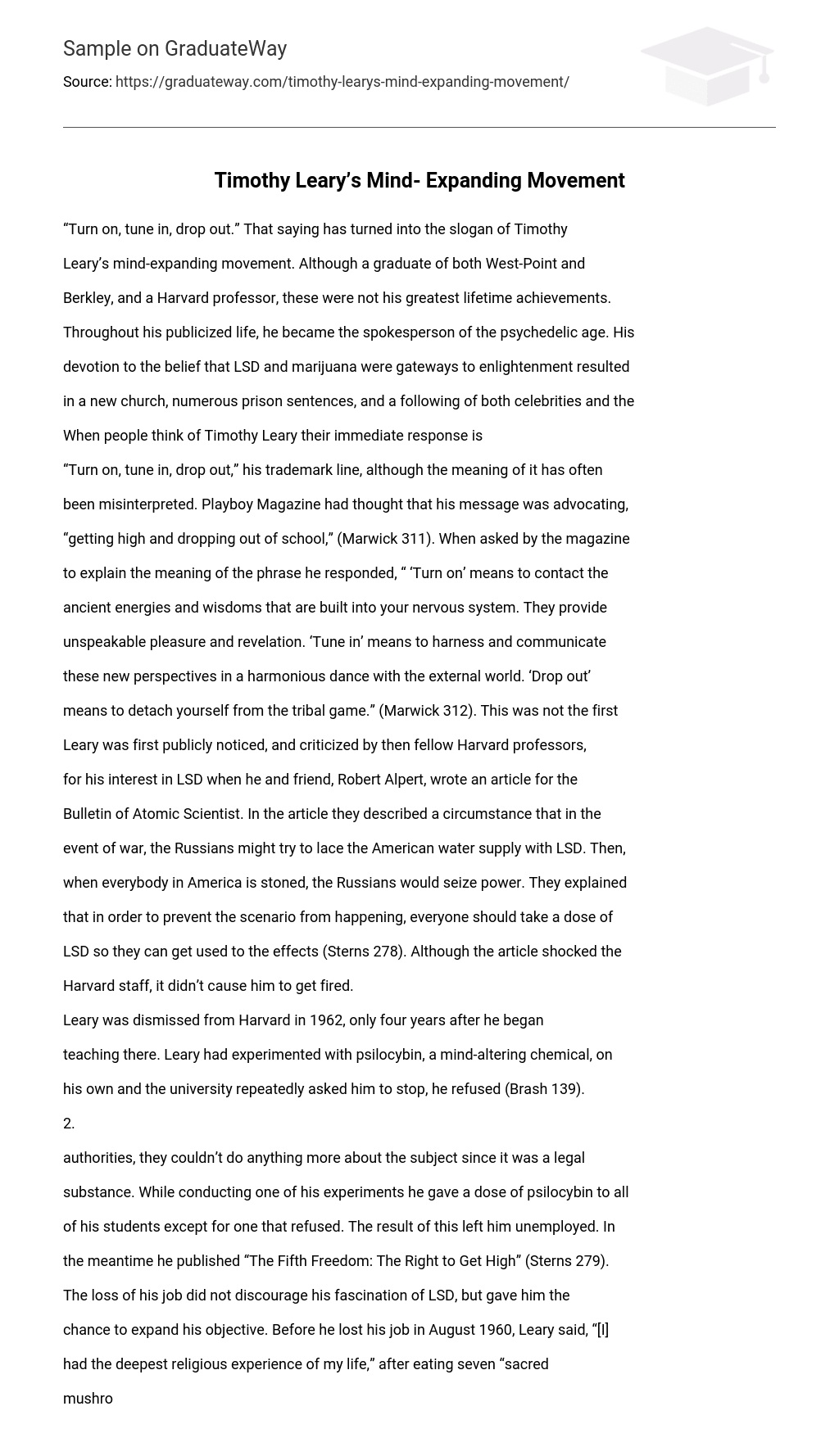Timothy Leary, a graduate of both West-Point and Berkley and a Harvard professor, became the spokesperson of the psychedelic age. Leary believed that LSD and marijuana could lead to enlightenment, leading him to establish a new church and earn several prison sentences. He also gained a following of celebrities and the general public. However, it is often misconstrued that his famous line “Turn on, tune in, drop out” endorsed getting high and leaving school, according to Playboy Magazine.
According to the magazine, the meaning of the phrase as explained by the individual is to “turn on” and connect with the ancient energies and wisdoms within one’s nervous system, which bring immense pleasure and revelation. “Tune in” is to utilize and convey these fresh perspectives in a harmonious interaction with the outside world. Lastly, “drop out” involves disengaging from the societal game.
Leary first attracted attention and faced criticism from his Harvard colleagues for his fascination with LSD. Alongside his friend Robert Alpert, he penned an article for the Bulletin of Atomic Scientists where they outlined a hypothetical situation wherein the Russians could contaminate the American water supply with LSD during a war. Their suggestion to counter this was for everyone in America to take a dose of LSD to familiarize themselves with its effects, thereby rendering the Russian plan ineffective (Sterns 278).
Despite causing controversy among the Harvard staff, the article did not result in his dismissal; however, Leary was ultimately fired from Harvard in 1962, only four years after becoming a teacher there. The reason for his termination was his personal experimentation with psilocybin, a mind-altering substance, despite multiple requests from the university to cease. Although legal limitations prevented further action against him, he administered psilocybin to all of his students except for one who declined during an experiment. As a consequence, he lost his job. In the meantime, he successfully published “The Fifth Freedom: The Right to Get High”.
Despite losing his job, the individual’s fascination with LSD was not deterred but rather provided an opportunity for expansion. Prior to his job loss in August 1960, Leary experienced his most profound religious encounter after consuming seven “sacred mushrooms” containing the chemical psilocybin. He repeated this act fifty times within three weeks and subsequently embraced Hinduism. During a lecture in Philadelphia on August 30, 1963, he elucidated on this experience, stating that it should result in a transformative individual and life. Since his illumination in August 1960, he has dedicated a significant portion of his efforts to comprehending the revelatory potential of the human nervous system and making these insights accessible to others.
Leary’s goal was to share his insights and offer others the same religious experience he had encountered by establishing a church. The creation of the League for Spiritual Discovery, commonly referred to by its initials, included the church’s guiding principle: “You have to be out of your mind to pray.” This church promoted the use of LSD once a week and marijuana on a daily basis. According to the church, the sacraments of marijuana and LSD should only be used by the initiates and priests within our religion, and only within designated shrines (Sterns 279).
Followers of the church donned flowing robes and engaged in meditation. According to Leary, the goal of both Eastern religions and LSD usage is to attain heightened consciousness and experience euphoria and enlightenment (Brash 139). Leary, together with his followers and associates Ken Kesey and Allen Ginsberg, actively advocated for this cause. However, Leary’s involvement with illegal drugs led to multiple arrests and subsequent imprisonment. In 1970, he was once again incarcerated in California for a drug offense. In an attempt to reduce his sentence, Leary struck a deal with the FBI after being apprehended while on the run in Afghanistan (Marwick 330).
After being freed, Leary continued to spread the wonders of LSD. He received assistance from various individuals such as the band Moody Blues, author Ken Kesey, poet Allen Ginsberg, and others. Keeping up with the changing times, Leary created a web page to share insights into his life and lifestyles. Despite suffering from cancer, Leary viewed death as a joyful event rather than a sorrowful one. His final words were “Why not?” and his longtime friend John Barlow wrote, “Timothy Leary died unashamed and, as always, having a great time. He fulfilled his promise to ‘give death a better name or die trying'” (Marwick 345).
Timothy Leary’s impact on society was significant, as he influenced numerous individuals during his lifetime. Whether or not he endorsed drug usage is irrelevant, even though it remains prominent in people’s memories. Instead, his life conveyed a more profound message: the determination of humans and their willingness to go to great lengths to convey their ideas to the public. Money was not his priority after losing his job at Harvard; instead, he believed wholeheartedly in his convictions. Leary genuinely believed that LSD had the potential to enlighten individuals, and his intentions were genuinely guided by a desire to offer assistance.
Works Cited
- Brash, Sarah. Turbulent Years The 60s. Alexandra: Time-Life Books Inc., 1998.
- Marwick, Arthur. The Sixties. New York: Oxford University Press, 1998.
- Sterns, Jane And Michael. Encyclopedia of Pop Culture. New York: HarperCollins, 1992.





